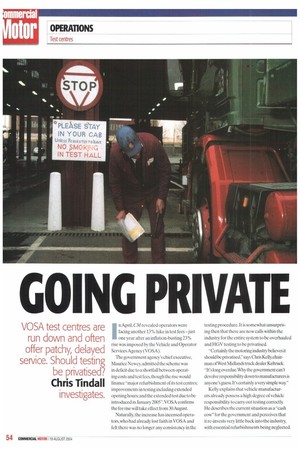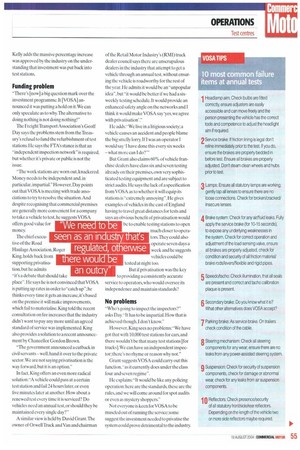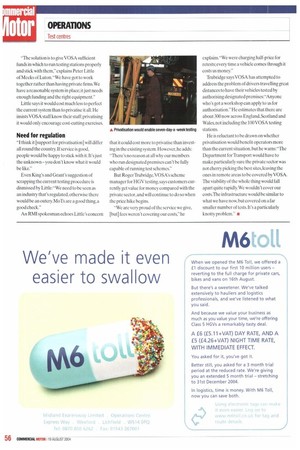GO
Page 54

Page 55

Page 56

If you've noticed an error in this article please click here to report it so we can fix it.
1
NG PR
1
ifitTE
VOSA test centres are run down and often offer patchy, delayed service. Should testing be privatised?
Chris Tindall investigates.
In April, CM revealed operators were facing another 13% hike in test fees —just one year after an inflation-busting 23% rise was imposed by the Vehicle and Operator Services Agency (VOSA).
The government agency's chief executive, Maurice Newey. admitted the scheme was in deficit due to a shortfall between operating costs and test fees, though the rise would finance "major refurbishment of its test centres; improvements in testing including extended opening hours; and the extended test due to be introduced in January 2005".VOSA confirms the fee rise will take effect from 30 August.
Naturally, the increase has incensed operators, who had already lost faith in VOSA and felt there was no longer any consistency in the testing procedure. It is somewhat unsurprising then that there are now calls within the industry for the entire system Lobe overhauled and HGV testing to be privatised.
"Certainly the motoring industry believes it should be privatised." says Chris Kelly,chairman of West Midlands truck dealer Keltruck. "It's long overdue.VVhy the government can't devolve responsibility down to manufacturers is anyone's guess. Ifs certainly a very simple way."
Kelly explains that vehicle manufacturers already possess a high degree of vehicle responsibility to carry out testing correctly. He describes the current situation as a "cash cow" for the government and perceives that it re-invests very little back into the industry, with essential refurbishments being neglected. Kelly adds the massive percentage increase was approved by the industry on the understanding that investment was put back into test stations.
Funding problem
"There's [now] a big question mark over the investment programme. It [VOSA] announced it was putting a hold on it We can only speculate as to why.The alternative to doing nothing is not doing nothing!"
The Freight Transport Association's Geoff Day says the problems stem from theTreasury's refusal to fund the refurbishment of test stations. He says the FTA's stance is that an "independent inspection network" is required, but whether it's private or public is not the issue.
"The work stations are worn out, knackered. Money needs to be independent and, in particular, impartial." However. Day points out that VOSA is meeting with trade associations to try to resolve the situation. And despite recognising that commercial premises are generally more convenient for a company to take a vehicle to test, he suggests VOSA offers good value for money.
The chief executive of the Road Haulage Association, Roger King, holds back from supporting privatisation,but he admits "it's a debate that should take place". He says he is not convinced that VOSA is putting up rates in order to "catch up"; he thinks every time it gets an increase, it's based on the premise it will make improvements, which fail to materialise. King told the recent consultation on fee increases that the industry didn't want to pay any more until an agreed standard of service was implemented. King also provides a solution to a recent announcement by Chancellor Gordon Brown.
"The government announced a cutback in civil servantswell hand it over to the private sector.We are not saying privatisation is the way forward, but it is an option."
In fact, King offers an even more radical solution: "A vehicle could pass at a certain test station and fail 24 hours later, or even five minutes later at another. How about a renewed test every time it is serviced? Do vehicles need an annual test, or should they be maintained every single day?"
A similar view is held by David Grant.The owner of OrwellTruck and Van and chairman
an outcry
of the Retail Motor Industry's (RMI) truck dealer council says there are unscrupulous dealers in the industry that attempt to get a vehicle through an annual test, without ensuring the vehicle is roadworthy for the rest of the year. He admits it would be an "unpopular idea-, but -it would be better if we had a sixweekly testing schedule. It would provide an enhanced safety angle on the networks and I think it would make VOSA say 'yes, we agree with privalisation'."
He adds: "We live in a litigious society; a vehicle causes an accident and people blame the big smelly lorry If! was an operator I would say 'I have done this every six weeks -what more can I do?"
But Grant also claims 60% of vehicle franchise dealers have class six and seven testing already on their premises, own very sophisticated testing equipment and are subject to strict audits. He says the lack of a specification from VOSA as to whether it will equip its stations is "extremely annoying". He gives examples of vehicles in the east of England having to travel great distances for tests and says an obvious benefit of privatisation would be to enable testing stations to open much closer to operators.They could also operate seven days a week and he suggests vehicles could be tested at night too.
But if privatisation was the key to providing a consistently accurate service to operators, who would oversee its independence and maintain standards?
No problems
"Who's going to inspect the inspectors?" asks Day. "It has to be impartial. How that is achieved though,! don't know."
However, King sees no problems:"We have got that with 10,000 test stations for cars, and there wouldn't be that many test stations [for trucks]. We can have an independent inspector; there's no rhyme or reason why not."
Grant suggests VOSA could carry out this function,-as it currently does under the class four and seven regime".
He explains: "It would be like any policing operation: here are the standards, these are the rules, and we will come around for spot audits or even as mystery shoppers."
Not everyone is keen for VOSA to be muscled out of running the service; some suggest the investment needed to privatise the system could prove detrimental to the industry. "The solution is to give VOSA sufficient funds in which to rim testing stations properly and stick with them," explains Peter Little of Meeks of Luton."We have got to work together rather than having private firms. We have a reasonable system in place; it just needs enough funding and the right equipment."
Little says it would cost much less to perfect the current system than to privatise it all. He insists VOSA staff know their stuff; privatising it would only encourage cost-cutting exercises.
Need for regulation "I think it [support for privatisation] will differ all round the country. If service is good, people would be happy to stick with it. It's just the unknownyou don't know what it would be like."
Even King's and Grant's suggestion of scrapping the current testing procedure is dismissed by Little:"We need to be seen as an industry that's regulated, otherwise there would be an outcry. MoTs are a good thing, a good check."
An RMI spokesman echoes Little's concern that it could cost more to privatise than investing in the existing system. However, he adds: "There's no reason at all why our members who run designated premises can't be fully capable of running test schemes."
But Roger Trubridge,VOSA's scheme manager for HGV testing,says customers currently get value for money compared with the private sector, and will continue to do so when the price hike begins.
"We are very proud of the service we give, [but] fees weren't covering our costs," he explains "We were charging half-price for retests;every time a vehicle comes through it costs us money."
Trubridge says VOSA has attempted to address the problem of drivers travelling great distances to have their vehicles tested by authorising designated premises: "Anyone who's got a workshop can apply to us for authorisation." He estimates that there are about 300 now across England, Scotland and Wales, not including the 100 VOSA testing stations.
He is reluctant to be drawn on whether privatisation would benefit operators more than the current situation, but he warns: "The Department for Transport would have to make particularly sure the private sector was not cherry picking the best sites, leaving the ones in remote areas to be covered by VOSA. The viability of the whole thing would fall apart quite rapidly. We wouldn't cover our costs.The infrastructure would be similar to what we have now, but covered on a far smaller number of tests. It's a particularly knotty problem." •




























































































































































































